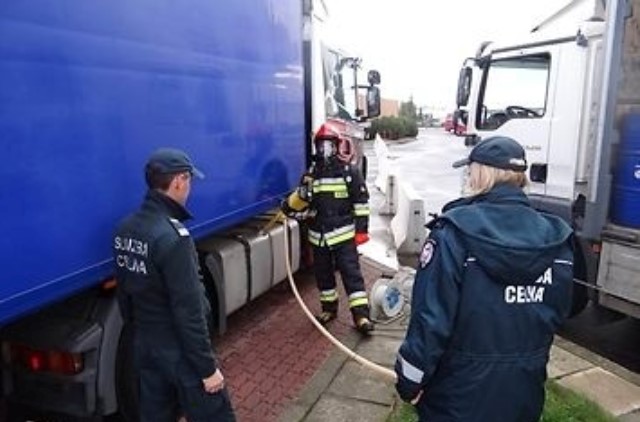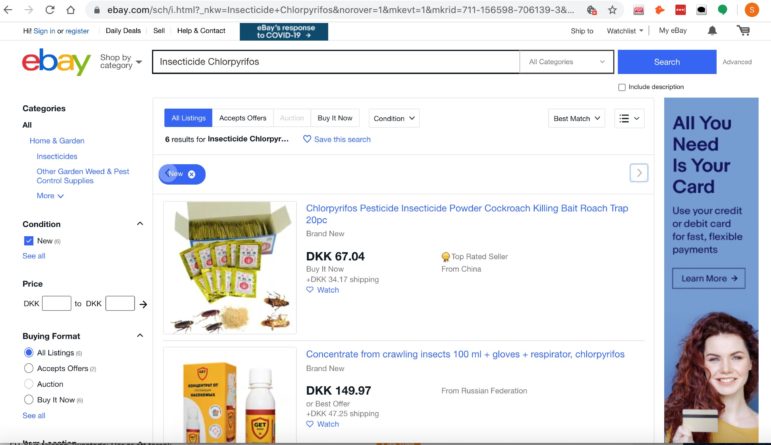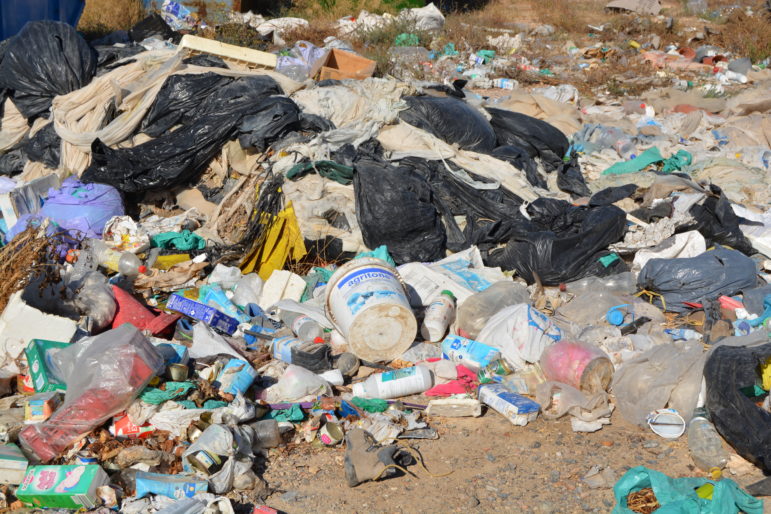
If you want to make money outside the law, forget guns, drugs, alcohol or cigarettes. Trade in illegal pesticides combines high profits with lower risks.
The crime is simple: buy non-authorised chemicals from China for 14 euros per litre and sell them on the European black market for five times the price. Deduct costs for packaging and transport and the net profit will be close to €70 euros on each litre, according to Europol, the EU’s crime-fighting agency.
A single shipment of 160 tons generates € 11,2 million. Tax-free and almost completely risk free. It’s a crime we can hardly see, and it very rarely comes to court.
” The risk of being arrested and convicted is small, while the margins of the product are huge,” says Rien Van Diesen, the expert in illegal pesticides at Europol,
The risk of being caught red-handed is minimal, and even then, the sanctions would hardly hurt.
Based on estimates from EU-institutions somewhere between one in ten and one in seven fields in Europe are being sprayed with pesticides that has evaded authorisation or regulatory checks.
Very few cases lead to prosecution
In Germany eleven cases of seized illegal pesticides have been brought to public prosecutors since 2011. None of them has so far led to a conviction. The authority for consumer protection and farming (BVL) has since 2008 withdrawn 40 permits for parallel trade – products manufactured by others than the original inventor. The 40 withdrawals on the ground of misuse for illegal pesticides can be compared to 2499 licences in force in May 2020.
”In this respect, the prosecution of illicit trade in pesticides is apparently a nationwide problem,” BVL noted in an official statement.
In Slovenia all in all 27,1 tons of illegal pesticides have been detected and seized since 2003 according to the Financial Administration. No court cases were initiated.
In Italy 1053 tons have been seized since 2017 leading to 531 administrative fines. Since 2015 four cases have been brought to court. One trial ended with all defendants being acquitted, one trial resulted in imprisonment for a year and fines between 600 and 1000 euro. The remaining two are pending.
In Belgium the Federal Agency for the Safety of the Food Chain has intercepted 20 imported shipments of suspected or illegal pesticides in the past five years. The Antwerp prosecutor’s office is currently conducting three investigations into illegal pesticides. In one case five pesticides have been taken off the market.
Two court cases about illegal pesticides were concluded in Belgium in 2019. One British company was convicted to a financial penalty of €60.000. One Belgian company suspected of selling counterfeit pesticides was cleared of all guilt because the deceptive intent was not proven.
A puzzled prosecutor
In Poland various breaches in pesticide trade inside the country have led to 3745 fines between 2016 and 2018, issued by the Plant Protection and Seed Inspection. The average amount has been €40€, less than a fine for speed driving.
There has also been a growing number of seizures at the Ukrainian border after the Polish authorities have intensified the controls. According to an informed Ukrainian source Poland’s role as gate to the European marked for illegal pesticides has diminished and been taken over by the Baltic states and by Moldova and Romania.
In the Netherlands Rob de Rijck, the national coordinating environmental prosecutor says he’s truly amazed with the low punishment perpetrators get for trading illegal pesticides:
”A Colombian wretch caught in the customs gets a year in jail for a kilogram swallowed cocaine, but a smuggler of six containers of pesticide gets away with the fine of € 40 000. I don’t get it. I honestly have no answer to this.”
”Classic environmental themes are pollution, wildlife and waste. Illegal pesticides seem to be a completely underestimated and underexposed problem,” he adds.
Growing online sale
In all the investigated countries, online sale has been a growing phenomenon. In Poland farmers unions estimates that half of the sale of illegal pesticides is done online, the other half through rumours and on traditional markets.
In USA online giant Amazon in 2018 accepted to pay a 1,2-million-dollar penalty for distributing illegal pesticides after a settlement with the Environmental Protection Agency. Amazon immediately removed the products from its website, banned foreign sellers from selling pesticides and stepped up the monitoring of its website for illegal pesticides, the Seattle Times reported.

Banned but for sale: Insecticide Chlorpyrifos no longer allowed in the EU, but easy to purchase at online site eBay.
Other online sites are less sensitive to regulations. The pesticide chlorpyrifos, an insect killer known to harm the brain of human foetus and children has been banned in the EU since January 2020. A random net search in May resulted in a quick return from online platform E-Bay offering both a Chinese and a Russian chlorpyrifos product to be delivered in Denmark.
Victims of the unknown
The pesticide market in Europe is worth €11bn a year. Between 10 and 15 per cent is believed to be illegal. The most recent estimate shared by the industry, the EU and OECD suggests that the black-market accounts for 13.8% of the total European use. That means 48 300 out of the 350 000 tons used every year, a figure quoted by the European Court of Auditors and other EU-institutions.
But there is no agreement across Europe about how to assess or detect the risks.
”Illegal pesticides have never been tested. There is no data on them. They can be poisonous, maybe not for humans but for bees; we just don’t know. It’s not a victimless crime, but the environment cannot speak for itself. That is why we need to be concerned,” says Europol’s Rien Van Diesen.
The latest annual report by the European Food Safety Authority on pesticides in food says 95,5 percent of 91,015 analysed samples fell below the maximum residue level. Of the remaining 4,5 percent above the accepted level 2,7 percent is explained by measurement uncertainty. The remaining 1,8 percent of the samples had not acceptable levels.
EFSA: NO concern for consumer health
EFSA concludes the findings do not pose concern for consumer health, but nevertheless finds a notable increase of samples of unknown origin. Member States are therefor asked to make sure this information is provided and recommended to follow up on imports of several non-approved pesticides in the EU.
Some of the incompliances with EU-regulations can be explained by illegal trade or misuse but EFSA has no way to know, according to spokesperson Flavio Fergnani.

Three risk scenarios with illegal pesticides
Pesticide Action Network (PAN), an environmental NGO, finds it disturbing that almost one third of the samples contained residues from two or more pesticides.
”Regulators continue to carry out the safety assessments as if humans are exposed to a single pesticide, and not mixtures, which according to EFSA’s annual report is not the case,” says Angeliki Lysimachou, science policy adviser at PAN.
Rafał Mładanowicz, head of the National Federation of Grain Producers Poland sees three risk scenarios with illegal pesticides: There is an obvious risk that a counterfeited pesticide has too high levels of toxic substances. But there’s also a risk if activators and fillers mixed with the toxic substance have a lesser quality.
” That means the product will not work. Farmer needs to spray again, use twice or even three times as much of the active substance. The levels of toxic substances then get dangerously high,” he explains.
A third risk occurs if illegal fungicides kill the wrong fungi, giving the targeted fungi more space to grow, damaging the crop and in the end harming consumers.
Cross-border encounter
Operation Silver Axe is a pan-European effort to hit back at on the illegal pesticides. It is an annual customs programme coordinated by the EU agency Europol with some 20 – 32 countries taking part.
Since 2015 the five inspections have resulted in the seizure of all in all 2 568 tons, on average 513,6 tons per year. This is 0,94 percent of the estimated 48 300 tons of illegal pesticides spread each year.
The latest inspection in spring 2020 involved 32 countries. It resulted in the seizure of 1 346 tons of illegal pesticides and led to 260 opened investigations. Two individuals were arrested.
Import through main northern European ports
One type of import takes place through the main northern European ports Antwerp, Rotterdam and Hamburg. According to Europol some of the major traders belong to networks based in the UK and Germany. These companies misuse legitimate transport companies and have the ability to store dangerous goods for different purposes. They operate in 5-6 countries doing both legal and illegal business.
Other smugglers using a mixture of legal and illegal trade are groups operating from Ukraine with supply chains reaching into the eastern part of the EU, including Greece. They have factories in Ukraine but also rely on import from Russia and China. Import ports can be Odessa in Ukraine, Koper in Slovenia, Rijeka in Croatia, Klaipeda in Lithuania and to a lesser extent Gdansk in Poland. Similar patterns are found, but less documented by Europol, in the Mediterranean countries.
Import of an active substance from China to the port of Koper can be sent to a warehouse somewhere in central Europe with a Chines invoice. The product is then blended and loaded on trucks to Russia, Ukraine, Moldova or Kazakhstan but with a different invoice. Parts if it is then smuggled back to the EU.
Crime groups, gold diggers and small-scale smugglers
This makes the advanced cross-border trade difficult to uncover as pesticides banned for use in the EU can be legally in transit for re-export. Banned pesticides can also be legally manufactured for export to markets outside the EU.
Besides companies working on both sides of the law, there are also what Europol call ” gold diggers”, business people who try to do a quick win, maybe one or two shipments and then disappear.
”On the other side of the spectrum we are facing six or seven groups operating in the organised crime way. We speak about 50 to 100 individuals involved,” Rien Van Diesen says.
Yet another kind of smuggling takes place along the 535 km long Ukrainian – Polish border. The amounts are often small but profitable, smuggled in car trunks, fuel tanks, handbags and rucksacks.
An example from 11th of January 2018: A man stands idle by his Volkswagen at a border crossing in Korczowa. Border police officers have just discovered pipes that connect the windshield spray tank to the fuel pump. If that’s where the fuel is, what’s in the fuel tank? 60 litres of illegal pesticides.
The two faces of China
The first identified case of trade in illegal pesticides was a shipment from China to Spain in 2000. China has since then been claimed to be the main source of counterfeited pesticides with India catching up in the statistics. Chinese organized crime groups are repeatedly pointed out as the biggest supplier. But there is more to China’s role than meets the eyes in counterfeit reports.
Since January 2020 state owned ChemChina is the sole owner of Swiss-based company Syngenta, the world´s largest pesticide producer. Chinese capital also dominates Israeli-based Adama, formerly known as Agan and Makhteshim, while China is depicted by OECD and EU-institutions to be the major contributor to the illegal trade.
At the same time China is described by industry as a cooperating partner. According to CropLife International, an association of the world’s six leading pesticide producers including Syngenta, the Chinese Institute for the Control of Agrochemicals ICAMA, was introduced to anti-counterfeiting initiatives in Europe back in 2010, and then again to the first Silver Axe programme five years later.
D’Arcy Quinn, Director Anti-Counterfeiting at CropLife says he was able to get ICAMA in answering questions from customs and regulators in the EU at the start of Silver Axe in 2015:
”ICAMA had so much information but nobody was really asking them. Customs and port authorities could ask: Dear pesticide importer, claiming to be importing from China, do you have this ICAMA 1-pager [a document to show the origin of an exported pesticide]? Sometimes the importer says, well we are not required to have it. The authority can then say no maybe you don’t have to, but we are still entitled to ask for these documents.”
Do you say national authorities and EU authorities have been reluctant to use this documentation?
”No, I think they are aware of it, but you know when you train people to a new method you would have to repeat, repeat and repeat. Because sometimes on the first round it does not always sink in, and then also there is staff changes with law enforcement, and all of a sudden, like two years later you’ll have a whole new team at the customs.”
The EU-Commission’s Anti-Fraud Office, OLAF, has a mandate to cooperate with third countries on preventing, detecting and combating fraud and irregularities, and has posted a liaison officer in Beijing to strengthen the cooperation with China. The Chinese authorities are said to collaborate and exchanges information with OLAF on fraud investigations, but there is scope for improving and speeding up the procedure, we are told.
The Chinese authorities have been asked to comment on the two aspects of the country’s role and how they regard the cooperation with their European counterparts. No answer was received in time for publication.
The investigation in illegal trade in pesticides is done by a group of journalists: Eva Achinger, Lorenzo Bagnoli, Antonio Baquero, George Brock, Kristof Clerix, Anuška Delić, Rasit Elibol, Caroline Henshaw, Nils Mulvad and Krzysztof Story contributed to this article. The research was supported by Journalismfund.eu and Reporters in the field/Robert Bosch Stiftung.
For this story the group did 76 interviews and 12 FOI requests.
Pingback: New EU pesticide targets could lead to unintended consequences - Consumer Choice Center